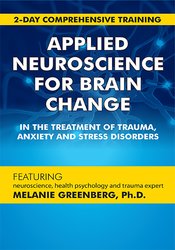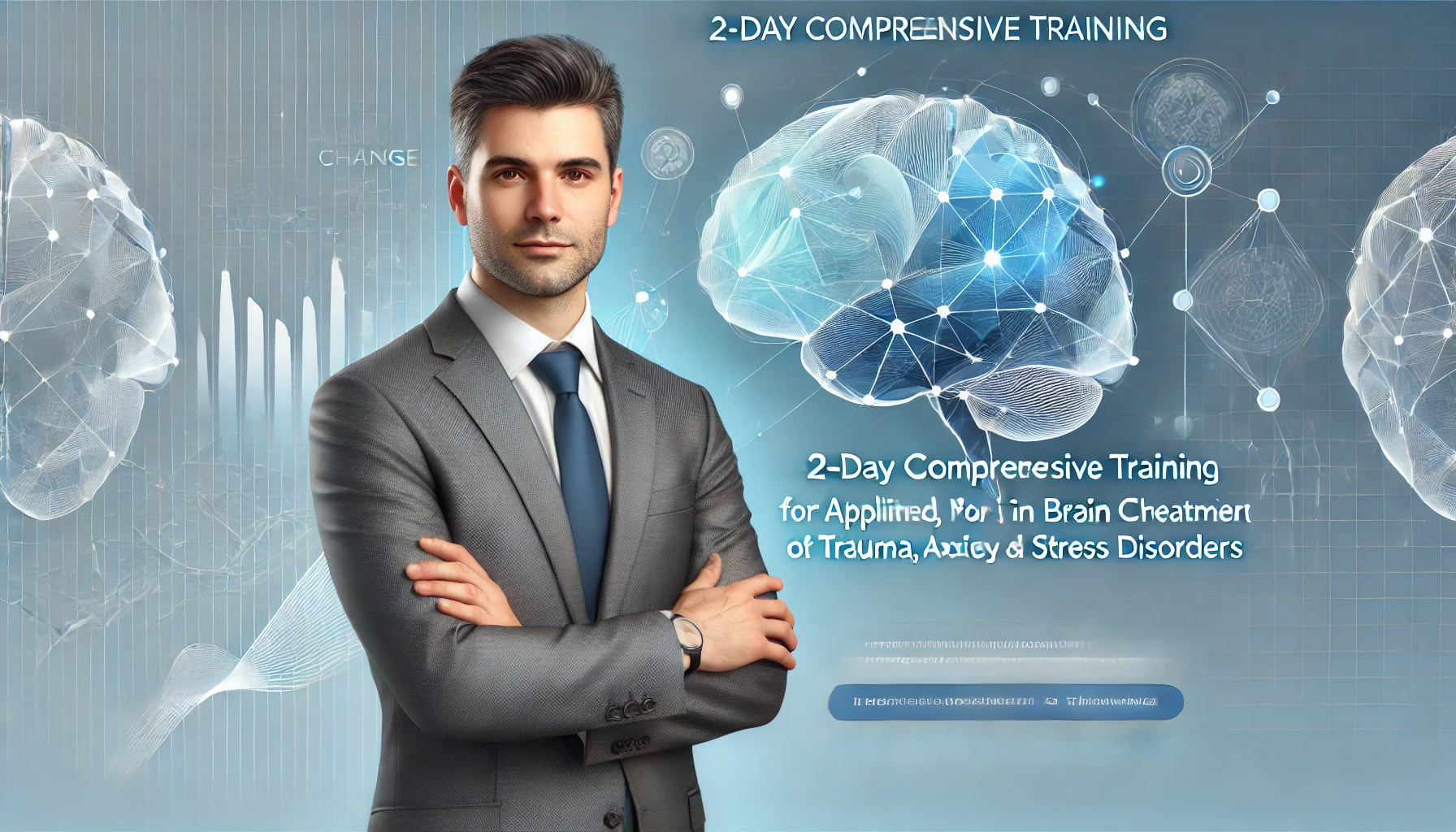2-Day Comprehensive Training -Applied Neuroscience for Brain Change in the Treatment of Trauma, Anxiety and Stress Disorders – Melanie Greenberg
2-Day Comprehensive Training -Applied Neuroscience for Brain Change in the Treatment of Trauma, Anxiety and Stress Disorders – Melanie Greenberg has the same quality as the author’s salapage.
Overview
Discover the Best Learning with 2-Day Comprehensive Training -Applied Neuroscience for Brain Change in the Treatment of Trauma, Anxiety and Stress Disorders – Melanie Greenberg
WisMentor is your ultimate destination for online learning. Explore "2-Day Comprehensive Training -Applied Neuroscience for Brain Change in the Treatment of Trauma, Anxiety and Stress Disorders – Melanie Greenberg" by top authors and instructors, designed to transform your skills and career. Start now and unlock your potential!
Salepage check: 2-Day Comprehensive Training -Applied Neuroscience for Brain Change in the Treatment of Trauma, Anxiety and Stress Disorders
Author: Melanie Greenberg
- Faculty:
- Melanie Greenberg
- Duration:
- 12 Hours 10 Minutes
- Format:
- Audio and Video
- Copyright:
- Jul 12, 2018
Description
This training program will help you master applying neuroscience in your clinical practice – transforming clients’ lives and improving your clinical skills.
Few trainings can offer you the following taught by skilled trainer and clinician, Melanie Greenberg, PhD:
- Apply proven brain-based and mindfulness strategies for treating anxiety, GAD, depression, PTSD and help clients handle major life events and chronic stressors
- Teach clients stress resilience skills like positive focus, growth mindset, engaging mind and body, and mental toughness
- Motivate clients and calm the brain’s stress response using the power of neuroplasticity
- Increase client engagement by focusing on changing the brain not just reducing symptoms
Advances in neuroscience and health psychology, positive psychology, and mindful self-compassion provide us with new tools to energize, strengthen, and update our approach to therapy.
Melanie began incorporating these brain- and strengths-based techniques 5 years ago and they have transformed her practice – making therapy more dynamic and interesting and creating more hopeful, engaged, and empowered clients.
When clients understand that they can actually rewire their brains by practicing new ways of thinking and behaving, they feel less stigmatized and stuck and more motivated to tolerate the discomfort in order to change. With these new techniques, we can help clients overcome helplessness, avoidance, and rigid negative self-views and instead develop a growth mindset that helps them overcome the constraints of the past and rebuild their inner and outer worlds for increased happiness and success.
Handouts
| Manual – Applied Neuroscience for Brain Change (16.30 MB) | 161 Pages | Available after Purchase |
Outline
Using Neuroscience in Treatment of Stress and Trauma
- Positives:
- Science gives authority, evidence, de-stigmatizes mental health problems
- Increased motivation and hope for change
- Concerns:
- Oversimplification, unrealistic expectations, changing state of science, see self as damaged or different
The Promise of Neuroplasticity
- Describe neuroplasticity in everyday language
- Therapy is about creating a new, more resilient brain
- We are changing beings – don’t have to be stuck in rigid views of self
- Teach brain to be less reactive to stress and triggers
- “Rewiring” as a metaphor for change
- Changing “raw,” unprocessed memories to organized narratives
The Brain’s Stress Response
- Historical view – Hans Selye
- The brain’s stress response “fight, flight, freeze”
- The triune brain – reptilian, mammalian, human
- The amygdala and the prefrontal cortex
- How the amygdala “hijacks” the brain into emergency mode
How the Stress Response is Spread Throughout the Body
- Neurotransmitters – Epinephrine, norepinephrine and cortisol
- The HPA axis and role of cortisol
- The sympathetic and parasympathetic nervous systems
- The dorsovagal “freeze” response to unavoidable threat
The Upside and Downside of Stress
- Increased motivation and engagement – “flow”state
- Can create mental toughness and resilience to future stressors
- Inflammatory response to chronic stress
- Stress and health risk behaviors (excess alcohol use, smoking, overeating etc)
- Stress and cellular aging (telomeres)
Traumas – Effects on the Brain
- Cortisol attacks the hippocampus – center of narrative memory
- Amygdala response increases in strength
- Impaired anterior cingulate cortex (ACC) and prefrontal cortical function
- Cortisol halts production of BDNF – fewer new brain cells formed
- Link to depression, anxiety disorders, PTSD
- Cognitive rigidity and inability to take in new information
- Changes in sense of self and dissociation
Long-Term Impact of Adverse Childhood Experiences (ACEs)
- The ACE Study (Kaiser and the CDC)
- Addictive and unhealthy ways of managing anxiety & negative emotions
- Disease, mental health issues, behavioral problems, PTSD
Explaining Neuroscience Concepts to Clients
- Use drawings and images
- Individualize to the type of difficulty (e.g., disengaged vs reactive – different brain areas)
- Redirect vs eliminate
- Help client label & recognize when happening (e.g., freeze, flooding, negative thinking, rigidity, impulsivity)
- Find coping strategies for each type of brain difficulty
Stress-Proofing the Brain – Overview
- Calming the amygdala – Grounding, mindfulness, self-compassion, perceiving control
- Moving forward with the prefrontal cortex – Cognitive reappraisal, priming positive mindsets and, growth focus, health psychology tools
Grounding Strategies for Clients with Trauma or Attachment Injuries
- Yoga, relaxation, breathing, present-moment focus, soothing with the senses, pets, drawing, gardening, walking
- Mental imagery – safe place, boundaries, energetic, times they felt strong/competent
- Left-brain strategies – task focus and engagement
Mindfulness Strategies
- Qualities of mindfulness states – open, nonjudgmental, fluid, deliberate,
- Observing and accepting inner experience (thoughts, feelings, sensations)
- Using the senses to self-regulate
- De-fusing from negative thoughts and self-images
- How mindfulness changes the brain
- Mindfulness practices – breathing, watching thoughts, urge surfing, open awareness
- Application to anxiety, depression, addictions, PTSD
Self-Compassion Strategies
- Self-kindness, common humanity, focus on unmet needs
- Application to depression, anxiety, stress-management, trauma, insecure attachment
- Link to Schema Therapy – healthy adult mode
- Practices – Metta meditation, soften, soothe and allow, dialogues with inner critic
Cognitive Strategies
- How stress and anxiety narrow attention, create cognitive rigidity
- Depression and negative thinking
- PTSD and internalized negative appraisals (helpless, unworthy, unsafe etc.)
- Worry and rumination cycles – link to prefrontal cortex and default mode network
- Why thought suppression doesn’t work
- De-catastrophizing and probability estimation
- Exposure and tolerating negative thoughts
- Using metaphors (monsters on the boat, bouncy ball underwater)
Creating Positive States of Mind to Counter Stress
- How our brains are wired to the negative
- Positive emotions can promote physiological recovery from anxiety and fear
- Reappraising anxiety as excitement
- Gratitude diaries
- Commitment, control, and challenge; growth mindset
Living Healthy in the Face of Stress
- Sleep disturbance – behavioral strategies
- Healthy coping strategies – exercise, meditation, yoga
- Dealing with emotional eating
Faculty
Melanie Greenberg, PhD Related seminars and products: 3
Melanie Greenberg, PhD, is a practicing psychologist, author, speaker, and executive coach with more than 20 years of professional experience. She has an active practice in Mill Valley, CA where she sees individuals and couples, teens and adults. Originally from South Africa, Melanie has a passion for psychological growth and healing. She loves to challenge, inspire and motivate. Melanie is the author of The Stress-Proof Brain (New Harbinger, 2017) – an Amazon bestseller in neuropsychology, stress-management, and health. She writes the popular Mindful Self-Express blog for Psychology Today (8 million page views) and has a substantial social media following. Melanie is a former professor in the clinical psychology Doctoral Program at Alliant International University, San Diego. She has delivered talks and workshops to national and international audiences, businesses, nonprofits, and professional organizations, including The American Psychological Association, Wisconsin Psychological Association, Society of Behavioral Medicine, and The Bay Club. She has also published more than 50 research articles and scholarly products. A popular media expert, she has been featured on CNN, Forbes, Inc., Business Insider, BBC radio, ABC News, Yahoo, AOL, and Lifehacker, as well as in Self, Redbook, Women’s Health, Men’s Health, Fitness Magazine and the Huffington Post. She has also been featured on radio shows and numerous podcasts. With almost 50,000 followers, she was named one of the Top Psychologists to follow on Twitter by The British Psychological Society. www.drmelaniegreenberg.com
Speaker Disclosure:
Financial: Melanie Greenberg is in private practice. She is an author for New Harbinger Publications and Psychology Today and receives royalties. Dr. Greenberg receives a honorarium from the Community Institute for Psychotherapy and National Charity League. She receives a speaking honorarium from PESI, Inc.
Non-financial: Melanie Greenberg is a member of the American Psychological Association; and California Psychological Association.
About 2-Day Comprehensive Training -Applied Neuroscience for Brain Change in the Treatment of Trauma, Anxiety and Stress Disorders – Melanie Greenberg and Our Expert Authors
2-Day Comprehensive Training -Applied Neuroscience for Brain Change in the Treatment of Trauma, Anxiety and Stress Disorders – Melanie Greenberg is part of our extensive collection of over 70,000 premium courses at WisMentor. Created by renowned authors and industry leaders, this course is tailored to provide cutting-edge knowledge and actionable insights.
Why Choose WisMentor?
- 🌟 Access courses from world-renowned authors.
- 📚 Wide range of topics to suit your professional and personal growth needs.
- 💼 Lifetime access and flexible learning options.
Key Features of 2-Day Comprehensive Training -Applied Neuroscience for Brain Change in the Treatment of Trauma, Anxiety and Stress Disorders – Melanie Greenberg:
- ✅ Comprehensive content covering essential topics.
- ✅ Evidence-based methodologies and practical examples.
- ✅ Learn at your own pace with expert guidance.
How to Access Your Course?
Getting started is easy:
- 📩 Receive an instant download link via email.
- 🌐 Access your course anytime through your account dashboard.
- 📱 Compatible with all devices for a seamless experience.
Need Help?
Our dedicated support team is here to assist you. Visit our Contact Us page or reach out via email for any queries or assistance.
More from Our Collection:
Don’t miss the opportunity to explore more courses from top authors and enrich your learning journey at WisMentor. Find your next course now and take your skills to the next level.
Curriculum
Requirements
- A commitment to engaging in both theoretical and practical components of the course.
- Prior experience in clinical practice is beneficial but not mandatory.
- A foundational understanding of psychology or a related field.
Features
- Comprehensive Resources: Access a wealth of materials, including slides, manuals, and supplementary readings.
- Interactive Learning: Engage in hands-on activities, case studies, and group discussions to reinforce learning.
- Expert Instruction: Benefit from the knowledge and experience of leading professionals in the field.
- Practical Applications: Learn actionable techniques to promote healthy brain changes in clients.
- In-Depth Curriculum: Explore the latest research in neuroscience related to trauma, anxiety, and stress disorders.
Target audiences
- Graduate students in psychology or related disciplines interested in applied neuroscience.
- Mental health professionals aiming to integrate neuroscience-based strategies into their practice.
- Licensed therapists, counselors, and psychologists seeking to enhance their therapeutic approaches.


